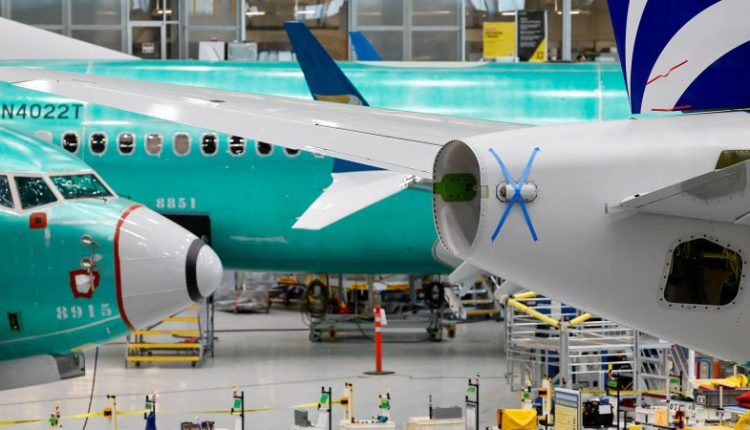Boeing and the families of the victims of two fatal 737 Max crashes more than five years ago will have to wait to see what punishment the company will face for its misdeeds that preceded the crashes.
A federal judge on Friday pressed US Justice Department officials to justify the terms of Boeing’s agreement to plead guilty to fraud in the wake of two fatal 737 Max crashes but stopped short of ruling on whether to accept the deal.
Attorneys for Boeing and federal prosecutors argued to US District Judge Reed O’Connor in Fort Worth, Texas, that he should accept the plea deal, while lawyers for relatives of the crash victims urged him to reject it. Boeing agreed in July to plead guilty to conspiring to defraud regulators.
Judge O’Connor said on Friday that he would issue a ruling as soon as possible.
The judge has fielded hundreds of pages of legal briefs from the parties over the past several weeks. In the courtroom on Friday, Paul Cassell, one of the lawyers representing the families of the 346 people who perished in the plane crashes, which occurred in 2018 and 2019, said “there are eight reasons to reject this rotten plea deal.”
They included his contention that the agreement allows a cash-flush corporation to dictate its punishments before sentencing, and that the deal failed to go far enough in holding Boeing or its executives accountable for the deaths of the families’ loved ones.
Sean Tonolli, the Justice Department’s senior deputy chief of the criminal division’s fraud section, defended the agreement as “fair and just,” and said that the government modified its approach to the plea agreement to take into account the families’ concerns.
Prosecutors arrived at the plea agreement after an extensive investigation and a series of meetings with the families, prosecutors said.
“Yet in the end,” the prosecutors said in an August court filing, DOJ officials have “not found the one thing that underlies the families’ most passionate objections to the proposed resolution: evidence that could prove beyond a reasonable doubt that Boeing’s fraud caused the deaths of their loved ones.”
Boeing “regrets the unspeakable losses suffered by the families,” Mark Filip, a lawyer representing Boeing, told the judge. He argued the judge should accept the plea agreement. The company previously said in a court filing that it was “prepared to plead guilty and thereby accept ultimate responsibility for the crime” of conspiring to defraud regulators. The planemaker has significantly strengthened, and increased investment in, its safety and compliance practices, Boeing said.
Boeing agreed in July to plead guilty to one charge of conspiracy to defraud the United States. Under the plea agreement it would pay up to $487 million in fines — a fraction of the $24.8 billion that families of victims of the two crashes want the company to pay.
The families argued that the amount of the fine amounted to a sweetheart deal for Boeing, letting it off the hook for the two fatal crashes that were caused by a design flaw on the planes. They argue that Boeing’s previous profits on every plane sold would allow for a much larger fine than the one the Justice Department argues it can justify under the plea agreement.
Boeing also agreed to spend $455 million on its compliance and safety programs over the next three years, which the government said will represent a 75% increase over what the company was spending annually on those programs.
But the biggest change under the plea agreement is Boeing agreed to operate under the supervision of a court-appointed monitor for a period of three years to make sure it improved the quality and safety of its aircraft.
The plea represented yet another black eye for the company after a series problems, ranging from embarrassing to tragic, for the company over the last six years. And it was a severe blow to the reputation of Boeing, a company once known for the quality and safety of its commercial planes.
Beyond the fatal crashes of the 737 Max jets, the company has faced a series of questions about the safety and quality of its planes. In January, a door plug on a 737 Max flown by Alaska Airlines blew out early in a flight, leaving a gaping hole in the side of the jet and further damaging Boeing’s reputation.
The Justice Department argued that the penalties Boeing agreed to were the most serious available. It argued it won other improvements as well, including the oversight of a monitor and the demand that Boeing spend more on safety and compliance of rules when building aircraft.
According to the charges, the company defrauded the Federal Aviation Administration during the process of certifying the 737 Max to carry its first passengers. The plane started service in 2017, but the two fatal crashes led to a 20-month grounding of the jets. Investigations revealed a design flaw in its autopilot system. Boeing has admitted responsibility for the fatal crashes, and that its employees withheld information about the design flaw from the FAA during certification.
In January 2021, the federal prosecutors and Boeing reached an agreement to settle criminal charges and defer any prosecution on the matter. During a three-year probationary period that followed, Boeing agreed to improve its quality issues and transparency with the government.
But the Alaska Airlines incident came just days before that probationary period was due to end, which led to a series of federal investigations into its practices and opened the door for this prosecution under the original agreement.
Read the full article here

